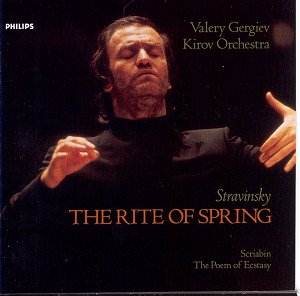Gergiev and his Orchestra took the Rite on tour in
1999 and appeared at the Royal Festival Hall with it. The reception
there was ecstatic (a few misguided souls excluded) and this recording
was made in Germany during this tour. The main criticism of the live
concert in London was that the playing of the orchestra was a little
imprecise. By recording live at two performances and making one from
two seems to have solved this (admittedly small) problem completely.
Like a few other ensembles around today, the main benefit
of this combination is the presence of the Music Director in front of
his orchestra sufficiently frequently for the ensemble to know exactly
what the conductor wants, and being sufficiently motivated to deliver
this. Gergiev certainly does this with a vengeance as he is conducting
this orchestra on a very frequent basis whether it is with Symphonic,
Opera or Ballet music. This experience of playing together pays enormous
dividends and these are clearly evident from the beginning. There are
numbers of very slight rhythmic quirks here and there and these are
followed to a man (or woman) as though they are all playing as the same
one musician.
The recording is, in addition, extremely impressive
with great depth and clarity – indeed at some points it sounds as though
the bass drum is on the move and is in your listening room. Judging
also by the absolute silence at the end, there were also some patching
sessions. Although the sleeve notes say that it is a live recording,
I cannot believe that the German audience was so unmoved that absolute
silence reigned at the end. Maybe the hall was full of our dissenters
from London.
After the Rite’s first performance in Paris (a pretty
scrappy affair by all accounts) orchestral standards have been getting
better and better, until today Stravinsky’s score holds little terrors
for even youth orchestras. What is missing from many modern performances
of the Rite is the primeval excitement of the score. Too often it is
an efficient run through as if to say "look and listen at us –
we can play this easily". This is rather missing the point, as
it should sound as though there has been a struggle in putting the score
in front of the audience. In this performance, what seems to have been
done is that this struggle is presented as raw power.
I have previously admired Stravinsky’s own recording
(on Sony Classics), or Dorati’s with the Minneapolis Symphony Orchestra
on Mercury, or Leonard Bernstein’s early recording with the New York
Philharmonic, all of which exhibit this struggle. Gergiev’s present
disc will probably now replace these in my listening material.
The remaining work on the disc is Scriabin’s Poem of
Ecstasy a strange work which couldn’t make up its mind whether to be
a symphonic poem or a symphony. After a number of changes, it was first
heard in 1907 - only seven years before the Rite, but sounding many
more. Here we are in Russian romantic mode with a wonderfully orchestrated
work utilising an orchestra similar in sized to the Rite. Am I alone,
however, in finding little melodic inspiration in most of Scriabin’s
works ? Still, you will have to go some way to hear this work better
played and recorded. The fault here, if you find one, is not in Gergiev
and his orchestra but with Scriabin.
An absolutely magnificent Rite of Spring – well worth
buying and enjoying.
John Phillips

![]() Kirov Orchestra/Valery
Gergiev
Kirov Orchestra/Valery
Gergiev ![]() PHILIPS 468 035-2 [55.20]
Fullprice
PHILIPS 468 035-2 [55.20]
Fullprice